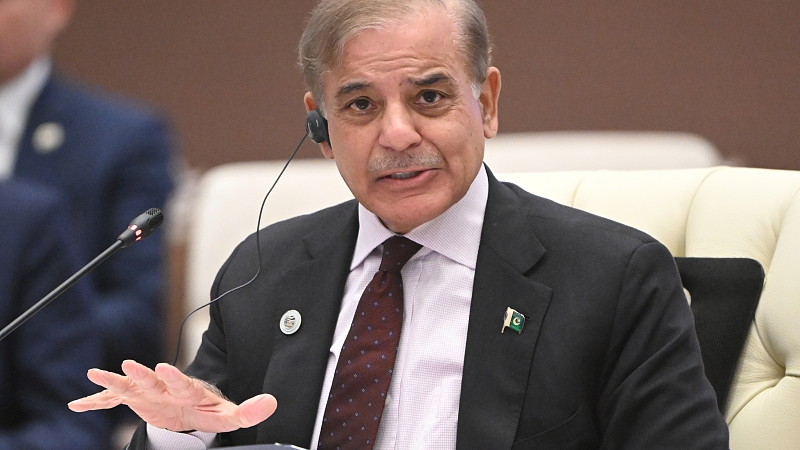
Pakistani Prime Minister Shahbaz Sharif attends the meeting of the 22nd SCO, Samarkand, Uzbekistan, September 16, 2022. /CFP
Pakistani Prime Minister Shahbaz Sharif attends the meeting of the 22nd SCO, Samarkand, Uzbekistan, September 16, 2022. /CFP
Editor's note: Ruqiya Anwar, a PhD scholar of Media and Communication Studies from Pakistan, is a researcher and socio-political analyst. The article reflects the author's opinions and not necessarily the views of CGTN.
In the historic Silk Road city of Samarkand, the presidents of China, Russia, India, Pakistan, Kazakhstan, Kyrgyzstan, Tajikistan, and Uzbekistan gathered on September 16 for a summit of the Shanghai Cooperation Organization (SCO). Along with special guests, the leaders of Armenia, Azerbaijan, Turkey, and Turkmenistan, and the leaders of SCO observer nations Belarus, Iran, and Mongolia also attended the Samarkand gathering. For centuries, this city has linked countries from Europe to China, uniting North and South, West and East into a single node.
The Samarkand Declaration, adopted by SCO leaders, outlined the organization's position on significant international and regional issues. In addition, they adopted four joint statements on maintaining dependable international supply chains and ones on food security, energy security, and climate change.
Taking this opportunity, Shahbaz Sharif, the Prime Minister of Pakistan stressed that the SCO members should act jointly to address the effects of climate change. He gave specifics about the human tragedy and the extensive destruction brought on by the climate catastrophe that hit Pakistan, and he expressed his sincere gratitude for the support SCO leaders gave for aiding those afflicted by the floods.
In light of the political and economic changes throughout the world, Pakistan's vision for the SCO's strategic direction was expressed in the Prime Minister's speech at the summit. Pakistan's commitment to the principles and objectives of the Shanghai Cooperation Organization Charter and the Shanghai Spirit as a core value of the SCO was also reaffirmed.
During the Samarkand gathering, the prime minister of Pakistan anticipated debt swaps for climate action, declaring that death, devastation, and destruction by Pakistan's floods resulted from global climate change. The issue, therefore, demands global cooperation and coordinated effort, despite Pakistan contributing less than one percent of the world's carbon footprint.

Uzbek President Shavkat Mirziyoyev and Pakistani Prime Minister Shahbaz Sharif shake hands at the 22nd SCO meeting, Samarkand, Uzbekistan, September 16, 2022. /CFP
Uzbek President Shavkat Mirziyoyev and Pakistani Prime Minister Shahbaz Sharif shake hands at the 22nd SCO meeting, Samarkand, Uzbekistan, September 16, 2022. /CFP
He added that one-third of the country is under water and that Pakistan is now experiencing an "entire burden of natural calamities in the form of heat waves, glacier outbursts, droughts, heavy rains, and record monsoons." He further emphasized that it was also an issue of justice, urging industrialized nations to "fulfil their climate financing pledges with a balanced focus on adaptation and mitigation," and added that the continued assistance of the international community in the rehabilitation and reconstruction of flood-devastated Pakistan is a matter of justice, not merely solidarity.
Additionally, to compensate developing nations most badly harmed by climate change, the prime minister suggested creating a "loss and damage funding facility." Finally, referring to the SCO's mandate, the prime minister stressed that the regional organization should coordinate efforts to resolve regional security threats and issues.
The SCO leaders have taken initiatives in diverse areas, including commerce, transport connectivity, industrial cooperation, energy, food, security, and climate change. Pakistan engages in the collective effort to maintain regional stability and economic growth in the SCO region, which is home to approximately 40 percent of the world's population.
Notably, António Guterres, the secretary-general of the United Nations, recently urged international financial organizations to develop a new framework to allow nations like Pakistan to invest in climate resilience and sustainable infrastructure rather than becoming swamped in debt payments. He asserted that "developing and middle-income nations like Pakistan, who are on the cusp of an exceedingly terrible financial scenario, should receive debt relief."
In the international climate negotiations, developing countries have long demanded a separate funding channel for loss and damage. However, the developed world has been reluctant to discuss the consequences of damage and loss. As a result, despite a push from developing countries, a finance facility could not be agreed upon at COP 26 in Glasgow last year, and only a structured discourse on loss and damage was created in the discussions.
Most importantly, this year's COP 27 discussions in Egypt will likely feature a lively discussion on loss and damage. As the chair of the largest group of developing nations, the G77 plus China, Pakistan could make a compelling argument to convince developed nations to agree the creation of a damage and loss finance facility in the wake of the record-breaking climatic condition which it has already witnessed this year.
Losses and damage will increase as the world goes slowly in transitioning away from fossil fuels and decarbonizing the global economy, and nations suffering harm they cannot afford require financial assistance. The integrity and interdependence of humanity are such that the majority of challenges require collaboration not only at the regional level but also on the global stage. Effective international cooperation improves the world's stability, predictability, and prosperity. This is the most viable, accessible, and near-term solution to global challenges.
(If you want to contribute and have specific expertise, please contact us at opinions@cgtn.com. Follow @thouse_opinions on Twitter to discover the latest commentaries in the CGTN Opinion Section.)

